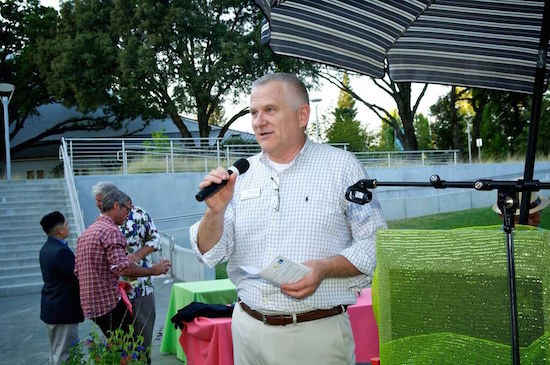 Had it not been for Mendo Lake Credit Union's willingness to give a member a discounted rate on an older RV loan, she may not have had a place to live after losing her home in the Valley Fire during California's 2015 wildfire season. She now plans to live in the RV until her home is rebuilt.
Had it not been for Mendo Lake Credit Union's willingness to give a member a discounted rate on an older RV loan, she may not have had a place to live after losing her home in the Valley Fire during California's 2015 wildfire season. She now plans to live in the RV until her home is rebuilt.
When another member with poor credit tragically lost her daughter in a fire, MLCU staff got creative in getting her the money she needed to cover final expenses for her child. Since then, the member has taken out a number of loans at the credit union and significantly improved her credit.
Two other members, an older couple who lost many of their assets in the stock market crash of 2008, managed to stay in their home until the husband's death after MLCU made a workout loan arrangement on their mortgage. The widow has since sold the house.
Recommended For You
These are just a few success stories offered by the recipient of CU Times' 2016 Trailblazer Award for Outstanding Service to the Underserved, a $216 million, Ukiah, Calif.-based institution serving 28,000 members in California's economically-challenged, rural Lake and Mendocino counties. And they just scratch the surface of MLCU's accomplishments. The recipient of three CDFI grants totaling $4.5 million, MLCU has earned a reputation as a community do-gooder, with staff members who take chances on those who are having financial trouble, have formed strong relationships with local organizations and even competitors, and were some of the first to initiate relief efforts during the Valley Fire that crippled the region last fall.
"When I first came on [as president/CEO during the Great Recession], a lot of what we did was help people who were struggling, and we'd ask, 'What's the worst case scenario?' We can help them out, and if it doesn't work, we won't be any worse off than we were before," MLCU President/CEO Richard Cooper said.
With no major employers located in either rural county, many residents of the credit union's member service area have struggled to make ends meet. According to the U.S. Census Bureau, the median household income in Lake County was $36,548 for 2009 to 2013, notably lower than California's median of $61,094. Twenty-five percent of the county's residents were below the poverty level, significantly higher than the state's 15.9%. The outlook is only slightly better in Mendocino County, where the median household income stood at $43,469 and 20% of residents were below the poverty level for 2009 to 2013.
Cooper noted that the counties, situated north of the Bay Area and the closest major city of Santa Rosa, offer limited employment opportunities including through local government, outdoor recreation and tourism organizations, the logging and fishing industries, several Indian casinos and a growing number of wineries. They also neighbor Sonoma and Napa counties, to which some residents commute for their jobs in the wine industry.
However, when Cooper – a 44-year industry veteran who previously served in executive roles for credit unions in Alaska and Southern California – took the helm of MLCU in 2008, things were very grim, he said.
"That was an extremely painful year, but we were an early adapter to the crisis," he said. "We all struggled, but what was surprising was that we didn't see many foreclosures. If someone had an income and some ability to repay, we worked with those members to keep them in their homes."
MLCU first opened in 1959 to serve local school employees, but opened its membership up to the community in the 1980s. Now, it primarily competes with one other credit union (the $2.8 billion, Santa Rosa-based Redwood Credit Union, which has a branch in Ukiah); a billion-dollar community bank, Savings Bank of Mendocino County; as well as several big banks with locations in Ukiah. However, as the credit union has carved a niche for itself introducing unbanked and underbanked individuals to basic financial products, it doesn't necessarily view those other institutions as competitors.
"We have a very friendly community relationship with them," Cooper said, referring to the community bank, SBMC and Redwood. "They focus more on small businesses and higher-end clientele, and we're more entry-level. There are a lot of community events where we serve as the joint major sponsors. It's unusual, but hey, we're the local folks."
The credit union also prides itself on offering reasonable loan alternatives to members who have fallen prey to extremely high interest rates at local payday lenders.
Auto lending was a major focus for MLCU following the Great Recession because, unlike in metropolitan areas, residents of the region require a vehicle to get to work, Cooper pointed out. MLCU's strategy included offering low auto loan rates, including some for lower credit tiers; and working closely with local auto dealers to cross-promote loan deals in the local media and on in-branch video screens. Cooper noted that MLCU is also one of the only local auto lenders open to dealers on weekends, which has helped bring in loans during prime car shopping times.
"In a rural area, if you don't have a vehicle, you don't have a job, so that's a strong motivator for making auto loans," Cooper said. "When you keep members in their vehicles, it also keeps the local economy going, and by keeping businesses open, we can help make Lake and Mendocino counties better places to live and work. We never said, 'Oh the economy's bad, so we can't do that.' We kept moving forward."
The credit union also zeroed in on one particular demographic that is widely unbanked or underbanked – Native Americans, who comprise 4.1% of Lake County's residents and 6.3% of Mendocino County's residents, according to the U.S. Census Bureau. Cooper noted that while the Native American population is less than 10% in the area, the group comprises a much larger share of the credit union's membership, as MLCU is the primary banker for three Native American tribes. To become a true financial partner for members of this demographic, MLCU staff focused on setting them up with entry-level products, such as debit cards and free basic account services, as well as working with the Northern Circle Indian Housing Authority and performing foreclosure prevention outreach. These efforts resulted in a California Reinvestment Coalition's Screaming Eagle Award for Community Cooperation to MLCU and NCIH in 2009.
 Cooper also emphasized another major key to MLCU's success is its high number of Spanish-speaking staff members. Seventy-five percent of the frontline staff at the credit union's main branch in Ukiah is bilingual, and on some days, next to no English is spoken there. In Lake and Mendocino counties, 19.1% and 24.1% of residents, respectively, are Hispanic.
Cooper also emphasized another major key to MLCU's success is its high number of Spanish-speaking staff members. Seventy-five percent of the frontline staff at the credit union's main branch in Ukiah is bilingual, and on some days, next to no English is spoken there. In Lake and Mendocino counties, 19.1% and 24.1% of residents, respectively, are Hispanic.
MLCU's commitment to serving the underserved has not only supported the local economy and helped members become more financially secure – it's resulted in significant growth at the credit union. From 2007 to 2015, it experienced membership growth of 148% (11,281 to 28,000), asset growth of 211% ($69.6 to $216.1 million) and loan growth of 120% ($58.7 to $129.3 million).
Partnering with local organizations to serve the community is another priority for MLCU. Two key partnerships are with the charitable organization North Coast Opportunities, with which the credit union organized successful fire relief programs over the past year, and the Economic Development and Financing Organization, which MLCU partners with for business loans. MLCU also helps bring financial education into local classrooms by sponsoring Banzai, an on-line financial literacy program.
When asked what makes MLCU so compatible with the underserved community, Cooper explained that employees are great at making members feel comfortable simply because they have so much in common with them. Frontline staff members grew up in the community, are allowed to dress casually every day, represent a variety of age groups and can relate to many of the stories of financial hardship that credit union members share.
"It's a comfort zone," Cooper said. "You might come into the branch straight from the field with mud all over you and a worried look that says, 'How am I going to repair my car or maybe even feed my kids?' And you'll be able to talk to someone who can help you and who speaks your language."
Looking ahead, the credit union plans to focus its efforts on providing continued relief to victims of the Valley Fire, which destroyed between 1,200 to 1,500 homes, and building its housing outreach and manufactured home loan programs.
And, 2016 will be the end of an era for Cooper, as he plans to retire at the end of the year.
"I am extremely proud of what MLCU has been able to create by living the old credit union motto of 'people helping people,'" Cooper said. "From our front line to our board of directors, the entire team is engaged and committed to our vision of making Mendocino and Lake Counties better places to live and work. That's as good as it gets!"
© 2025 ALM Global, LLC, All Rights Reserved. Request academic re-use from www.copyright.com. All other uses, submit a request to [email protected]. For more information visit Asset & Logo Licensing.








